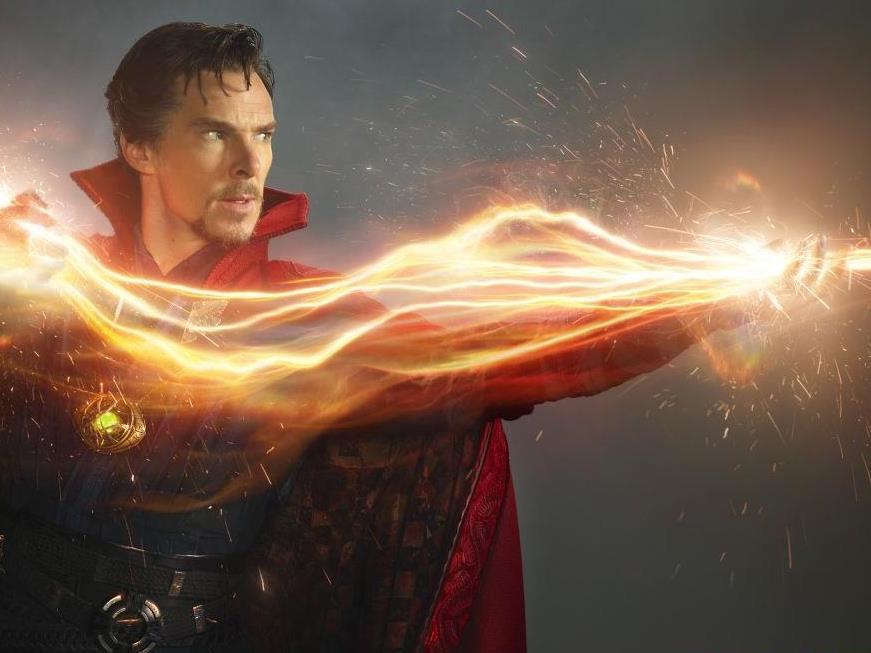Benedict Cumberbatch as Doctor Strange. Image via Marvel.
It’s tempting to call Doctor Strange an odd Marvel movie, or to use many of the other terms synonymous with its protagonist’s name and its title. And yet, like most things labelled unusual, the big screen tale of a neurosurgeon awakened to the mystical possibilities of the universe is simply different from the rest of its comic book brethren – mostly. The fourteenth feature in the Marvel Cinematic Universe introduces a character that’s far from a household name, though he’s still grappling with his new situation in an origin story. He’s the kind of superhero battling unseen forces rather than fighting in the street, even if there’s still some of that as well; the future of humanity remains at stake either way.
The otherworldly elements, the familiar structure: this is overwhelmingly great news for existing fans of the exploits of Iron Man and company that have come before, those experiencing fatigue from the onslaught of comic book efforts that’ve made it to cinemas over the last decade, and the scarce few that might’ve managed to avoid what’s now become its own genre altogether. Writer/director Scott Derrickson (Deliver Us From Evil), his Sinister co-scribe C. Robert Cargill and Prometheus’ Jon Spaihts blend the new, the old, the expected and the surprising into a not-so-cookie-cutter superhero blockbuster that brandishes the same shape, but not the same feel, as its predecessors. Thor, Guardians of the Galaxy and Ant-Man might’ve already paved the way; however Doctor Strange steeps their goofy, quirky take on saving the world in its own sensibilities.
Of course, the brilliant, arrogant, ambitious, willing to do whatever it takes to get ahead (letting his personal relationships fall by the wayside included, if necessary) Dr Stephen Strange (Benedict Cumberbatch, TV’s Sherlock) is just the type of character that would forge his own path, though finding himself seeking mystical assistance isn’t his own choosing. After an accident cripples the hands he relies upon to perform delicate surgeries, his determination to regain his prowess leads him to Nepal, and to The Ancient One (Tilda Swinton, A Bigger Splash). She agrees to assist; what she really does is open Strange’s mind to other dimensions and the abilities that come with them. With former disciple Kaecilius (Mads Mikkelsen, Men & Chicken) trying to use her teachings for more nefarious deeds at the same time, Strange’s transformation couldn’t be timelier.
Everything looks, well, strange to Strange once he embraces his new way of life – with the help of fellow student Mordo (Chiwetel Ejiofor, Triple 9) and master Wong (Benedict Wong, The Martian) too – and Derrickson endeavours to ensure viewers feel the same way. If the film’s story often fits the usual template, complete with witty banter and amusing pop culture references, its visuals definitely, purposefully and noticeably don’t. With superhero fare now such a common presence on our screens, it has become all-too-easy to forget that they hail from the realm of science fiction, unless you’re watching cities and buildings fold, twist and turn, time freeze and change, and figures jump throughout altered worlds in the process. Doctor Strange pushes its spectacular, hallucinatory, surrealist-leaning images to the fore to ensure that viewers always know that they’re watching something that’s far from ordinary or even earthly, though it’s not a mere distraction technique.
It’s all there in the name, really: you can’t make a movie about someone called Doctor Strange without leaning in to the accompanying oddities, even within an established series with clear parameters. And even there, the film dares to defy the norm; a warm-up to bigger, better things down the line, or a chance to shoehorn in as many recognisable faces as possible, pleasingly isn’t the aim of the game for once. Indeed, as well as its free-wheeling, careening and just generally looser tone, as matched by Michael Giacchino’s (Star Trek Beyond) pitch-perfect score, Doctor Strange boasts a restrained dose of Marvel’s now-expected winking, nodding behaviour. It’s a welcome point of difference that makes the movie feel fresh and atypical just by breaking a much-repeated pattern.
Enter Cumberbatch and his co-stars, who also mix up the standard dynamic. While much has been made of Swinton’s white-washed casting, the array of talent assembled remains diverse and wholly up to the task of acting out their supernatural adventure with just the right balance of seriousness and levity. Rachel McAdams (Spotlight) fares worst as a love interest and fellow surgeon with too little screen time, and here’s hoping for expanded roles for Ejiofor and Wong in future instalments; however whenever the key duo of Cumberbatch and Swinton share a scene, Doctor Strange shines not just courtesy of its left-of-centre, franchise-eschewing tendencies, but thanks to lively, engaging and empathetic portrayals. Well, when they’re not playing second fiddle to a levitating cape, that is, because this really is that style of superhero film, and refreshingly, entertainingly and excitingly so.
Rating: 4 stars out of 5
Doctor Strange
Director: Scott Derrickson
USA, 2016, 115 mins
Release date: October 27
Distributor: Disney
Rated: M
Actors:
Director:
Format:
Country:
Release:





